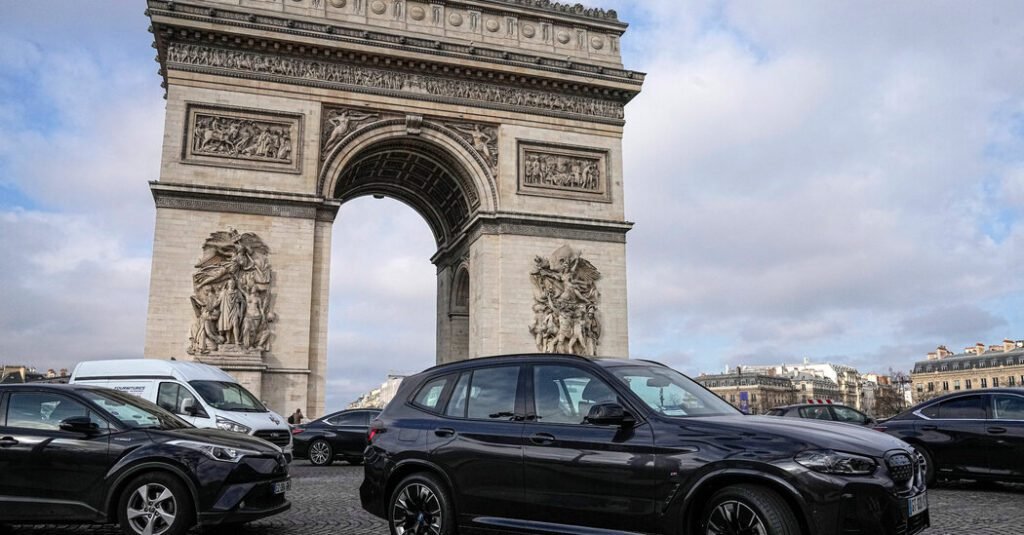Paris voters approved a bid to drastically increase parking fees for large sports utility vehicles and other heavy cars, the latest move by Mayor Anne Hidalgo to reshape the French capital with environmentally conscious and pedestrian-friendly policies.
The new parking charges are expected to be approved in May by the Paris City Council, where Ms Hidalgo’s Socialist Party and Green allies have a majority. The new fees are then expected to take effect in September, Ms. Hidalgo said.
Some car owners have complained they are being barred from the capital, but Ms Hidalgo was unrepentant at a press conference on Sunday night. “The Parisians made a clear choice,” he said, adding that “we are very proud of this result.”
However, attendance was extremely low. While about 54.5 percent of Parisians voted in favor of the measure, only about 5.7 percent of voters went to the polls.
While much of the public debate has focused on SUVs or sports utility vehicles, the new charges will apply to all cars weighing more than 1.6 metric tons if they have traditional internal combustion engines or are hybrids, or more than two metric tons if they are electric.
People with these vehicles will have to pay 18 euros, up from $19, for the first hour of public parking in central Paris and 12 euros in the French capital’s outer neighborhoods — three times the normal cost. For extra hours, prices rise sharply, so drivers of the SUV-like vehicles will end up paying more than $240 for six hours of parking in central Paris, instead of about $80 for regular cars.
However, there are several exceptions, so the measure will mainly apply to external visitors.
Paris residents who park in their neighborhood will not be affected. Not taxis or other commercial vehicles, not people using larger vehicles because of a disability.
City officials had argued that large SUVs and other large cars emit more greenhouse gases than midsize cars and are more dangerous to pedestrians because of their bulk, citing a report that suggests pedestrians are twice as likely to be killed in a collision with SUV. than with a standard vehicle.
The referendum on parking fees was the second time in recent months that Ms Hidalgo has sought direct popular approval for policies aimed at making the city more attractive to pedestrians and cyclists.
In April, Parisians voted to ban electric scooter rentals from the streets of the French capital, a measure that took effect in September after complaints that they effectively took over sidewalks.
As mayor since 2014, Ms. Hidalgo has pushed to make the capital less car-centric, closing roads along some banks of the Seine River to motorized vehicles and greatly expanding the number of bike lanes.
Paris is served by a dense metro and bus network, although this summer’s Olympics, which are expected to attract millions of visitors, could seriously test the capital’s transport.
City officials said before Sunday’s vote that while the number of car owners and cars in the capital had steadily declined over the past decade, the average car size had increased.
The city cited a 2020 report by the World Wide Fund for Nature that said the trend toward bigger cars threatened France’s climate goals.
David Béliard, the deputy mayor in charge of transport in Paris, said the referendum was proof that despite pushing for “unpopular” measures such as higher parking fees, “when you encourage debate, when you try to explain, you end up with decisions that it is in favor of the climate, the environment and health”.
SUVs are becoming more popular around the world, a trend that experts say is a hindrance to efforts to fight climate change because they tend to be less fuel-efficient than smaller cars.
The International Energy Agency, the world’s top energy agency, said in an analysis last year that carbon dioxide emissions from SUVs worldwide had reached nearly one billion metric tons by 2022, despite the growing popularity of electric models.
But Ms Hidalgo’s opponents – motorist groups and her centrist and right-wing political opponents on the City Council – complained that the debate was skewed.
On Sunday, voters were asked if they were “against the establishment of a specific parking rate for heavy, cumbersome, polluting private cars?”
“Given how biased the question was, the result is a snub for the mayor,” said Philippe Nozière, president of 40 Million Motorists, a motorist lobby group.
Mr Nozière said the new fees would unfairly affect tourists, residents of the capital’s suburbs and Parisian families. Sport utility vehicles and similar crossover cars have only become more popular because of increasing safety regulations, he said.
“Madame. Hidalgo doesn’t want any more cars in Paris,” said Mr. Nozière. “In that case, he should just come out and say so.”
The referendum showed a clear divide in Paris between the capital’s wealthier western neighborhoods, which overwhelmingly voted against the new parking charges, and the city’s more working-class and socially diverse eastern neighborhoods, which overwhelmingly voted in favor.
Mr Belliard, the deputy mayor, said around 10 to 15 per cent of cars currently on the road in Paris would be affected by the increased parking fees. He acknowledged that some newly built SUVs were less polluting than smaller, older cars. But he argued that automakers should be encouraged to use fewer resources, not more.
“If you build bigger, heavier vehicles, you need more materials and more energy than building lighter ones,” he said. “You have to look at the whole thing.”

